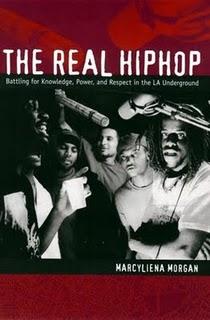The Real HipHop: Battling for Knowledge, Power, and Respect in the LA Underground

As a Euro-Native girl growing up neglected in a Canadian redneck home in the late '80s and early '90s, I copied my anti-establishment parents by hanging with drug dealers, thieves, and bikers. The only element of life I drew inspiration from was the arts: drawing, making and listening music, and martial arts. Like other devalued teens, I made my car into a boom box on wheels, which pounded out angry, loud, beats from artists like NWA's "Fuck the Police" and Metallica's "Seek and Destroy."
Youth across the globe have been marginalized, abused, neglected, and incarcerated, but Marcyliena Morgan gives hope to current and future generations by providing background on the start of hip-hop and revealing its multifaceted layers. In The Real Hiphop, Morgan covers many artists and the process it takes from beginner to seasoned professional. She includes famous names like Public Enemy and Queen Latifah while others, such as Medusa and Chu, were completely new to me.
Morgan’s work also does a hefty job of paying respect to hip-hop. I was blown away by all the work it takes to become a decent MC: music of the past is learned, kids cut their teeth on the stage (risking rejection in front of crowds at places like Project Blowed), and the sheer mastery it takes to improve rhyme on the spot while making coherent sense is an art form descended from jazz.
To be a player in the underground hip-hop scene, you have to know your shit. There can’t be any faking, like in mainstream music. It’s a spur of the moment adrenaline rush, and battling it out with words is a great growing process. Reading Morgan’s account of it all shows just how diverse and vibrant these communities are.
Sadly, not everyone sees hip-hop as a valid art form. Police harassment and communal apprehension create divisions between people and demonize black youth. Institutions such as the LAPD, which uses “ghetto birds”–helicopters that fly overhead–to keep an eye on hip-hop gatherings in Leimert Park, treat youth as criminals.
The Real Hiphop is a testament to the versatile creativity of underground artists who use words to make change. Such talent affects not only the communities that create it, but places across the globe, like the tiny Canadian town I grew up in or a big Japanese city like Tokyo. To “keep it real” is to give voice to your own experiences and truth, to keep speaking when the mainstream machine tries to silence you.